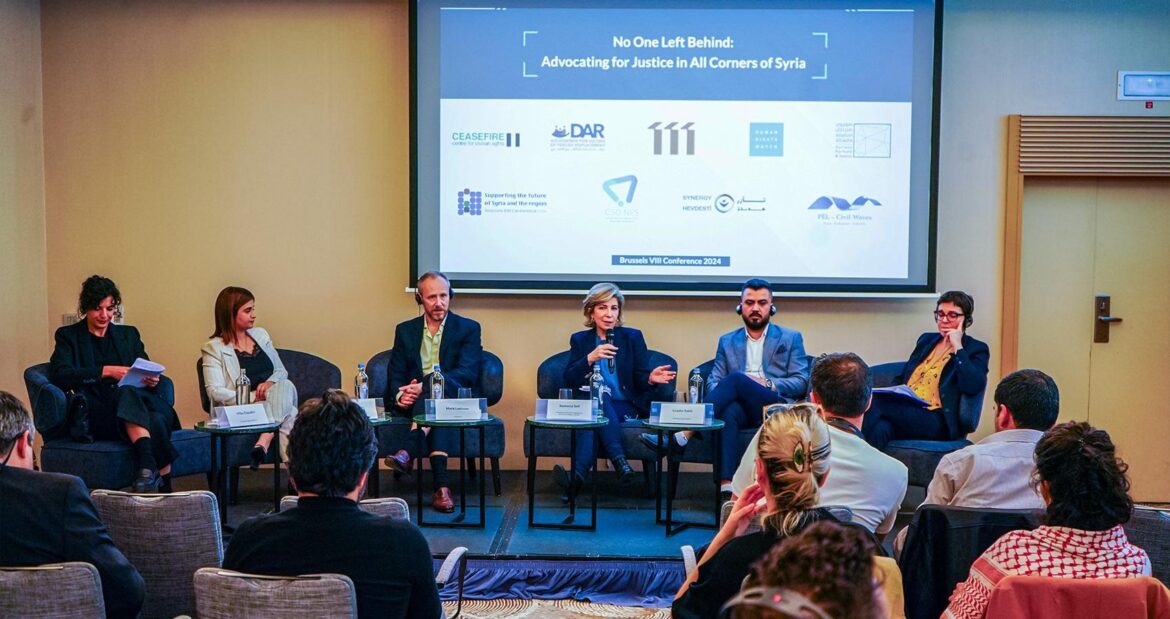On 29 April 2024, during the Brussels VIII Conference on supporting the future of Syria and the Region, a coalition of international and Syrian organizations hosted a joint side event in Brussels, Belgium. The event focused on discussing the available means of justice for victims in Syria, particularly in northern Syria.
The event was jointly organized by Syrian for Truth and Justice (STJ), Human Rights Watch (HRW), the Ceasefire Centre for Civilian Rights, the Belgium 11.11.11 Organization, the DAR Association for Victims of Forced Displacement, the Coalition of Civil Society Organizations in North and East Syria (CSO – NES), the Synergy/Hevdesti Association for Victims, and the PÊL – Civil Waves Organization.
The discussion was moderated by Mark Lattimer, the Executive Director at the Ceasefire Centre, and the speakers were: Caroline Howard, Head of Investigation Team at the United Nations Commission of Inquiry on Syria – (COI), Hiba Zayadin, Senior Researcher at HRW, Joumana Seif, Legal Advisor at the European Center for Constitutional and Human Rights – (ECCHR), Simav Hasan, Communication and Advocacy Manager at STJ, Izzadin Saleh, Executive Director at Synergy Association.
Caroline Howard discussed the COI’s work since its establishment in 2011, stating, “The most important thing we can do is provide a record for the international community about the violations occurring in Syria. To date, we have presented and published more than 15 reports on the human rights situation in Syria. We provided briefings to the Security Council, the UN General Assembly, and the Human Rights Council and interviewed more than 10,000 witnesses and activists in Syria. This led to several conclusions and recommendations adopted by various judicial bodies.”
Hiba Zayadin discussed the widespread violations in Syria, including the use of banned weapons, politicization and weaponization of services, and systematic destruction of infrastructure, particularly in northern Syria. She stated, “The fact that parties to the conflict have evaded punishment for numerous crimes cannot be overlooked, and this situation is likely to persist due to the fragile and non-independent national judicial system.”
Zayadin also highlighted the challenges that prevent victims and survivors from accessing justice. She emphasized that there are double standards internationally, which lead to a focus on specific conflicts at the expense of others.
Izzadin Saleh drew attention to the countless human rights violations in northern Syria, particularly in areas occupied by Türkiye such as Afrin, Ras al-Ayn/Serê Kaniyê, and Tell Abyad/Girê Spi. Saleh emphasized that these violations are well-documented by international organizations and attributed the continuation and exacerbation of these violations to “Impunity, the absence of complaint and reporting mechanisms for victims, and the lack of penalties for violators. These issues have made [displaced] people reluctant to return to their areas.”
Simav Hasan emphasized that the violations related to the conflict in Syria continue, and Türkiye’s violations are not limited to the areas it occupies. Turkish strikes on public facilities and civilian attacks are causing loss of life and depriving residents of access to basic services, which threatens their presence in the region.
Joumana Seif discussed the use of universal jurisdiction as a way for victims in Syria to seek justice when national courts are unable to initiate investigations into crimes in the country. She stated, “Trials and investigations are being conducted for war crimes and international crimes committed in Syria, with several arrest warrants issued by international courts. I believe that civil society, thanks to the efforts of male and female survivors and the support of other institutions, has succeeded in keeping the accountability file on the table, which is considered the most important card in the future of Syria.” Seif emphasized that the solution lies in non-discriminatory justice based on the narrative of the victims, regardless of the violating party.
Watch the full session here.

